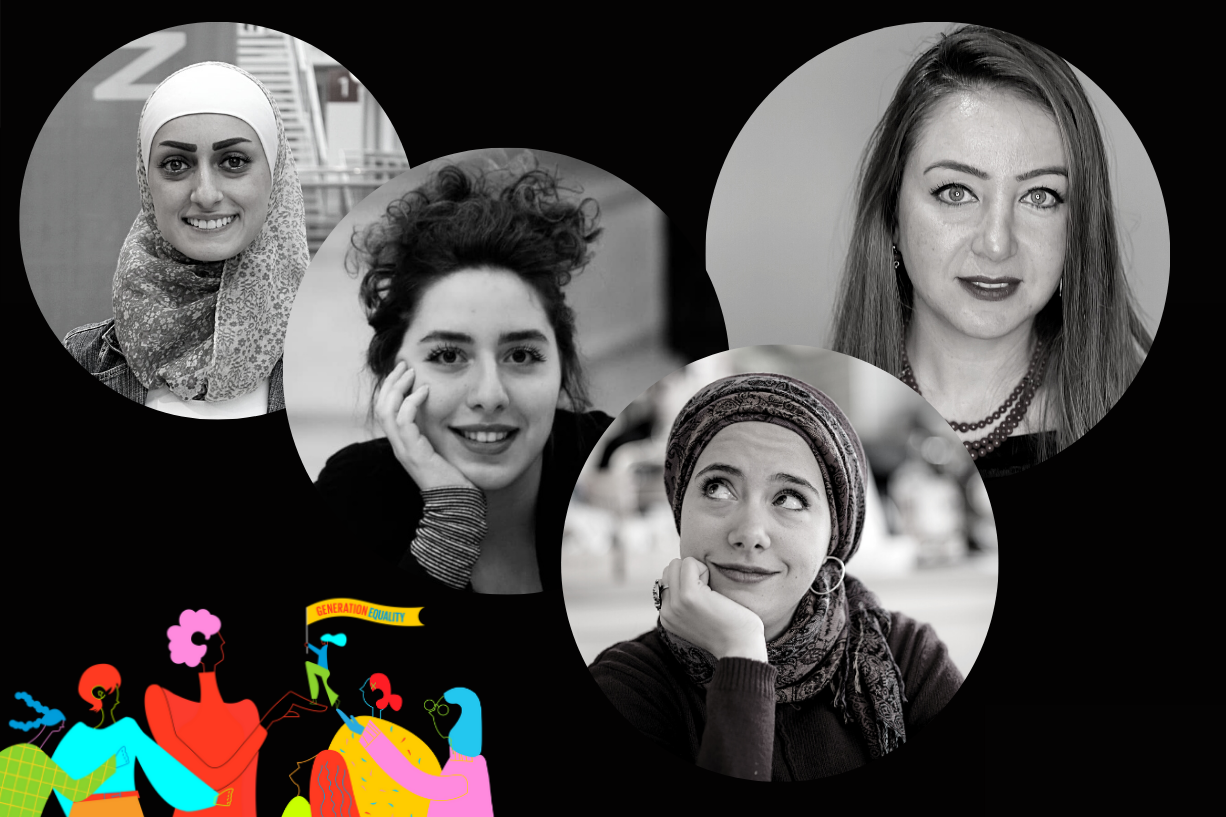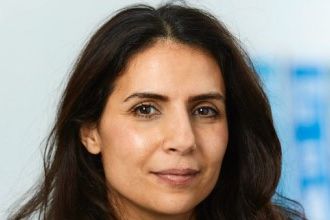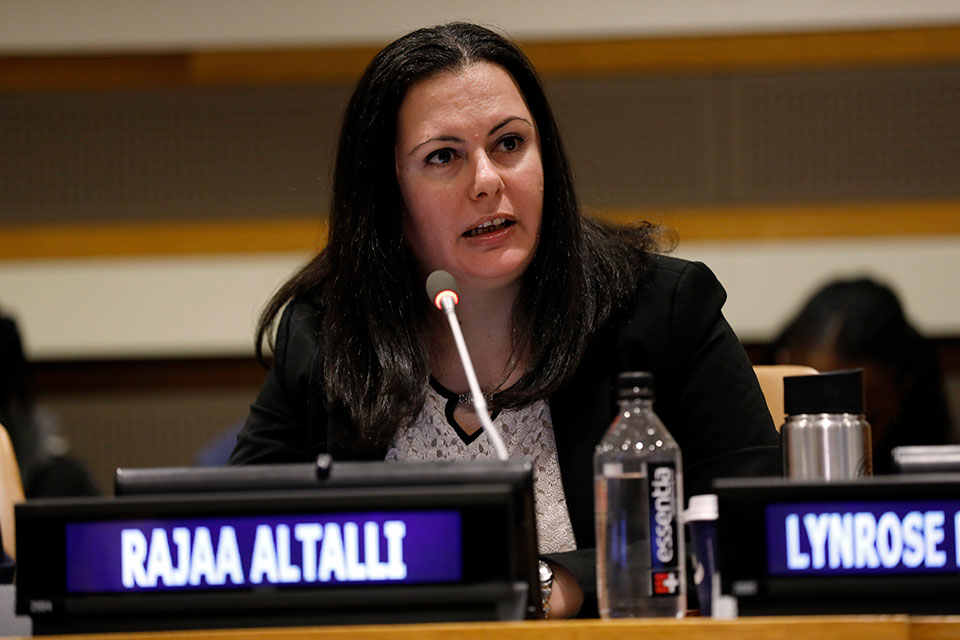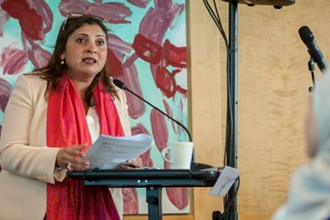Supporting Syrian Women’s Engagement in the Syrian Political Process: Building a Constituency for Peace
A UN Women programme to strengthen dialogue and ensure women’s meaningful participation in Syria’s future.
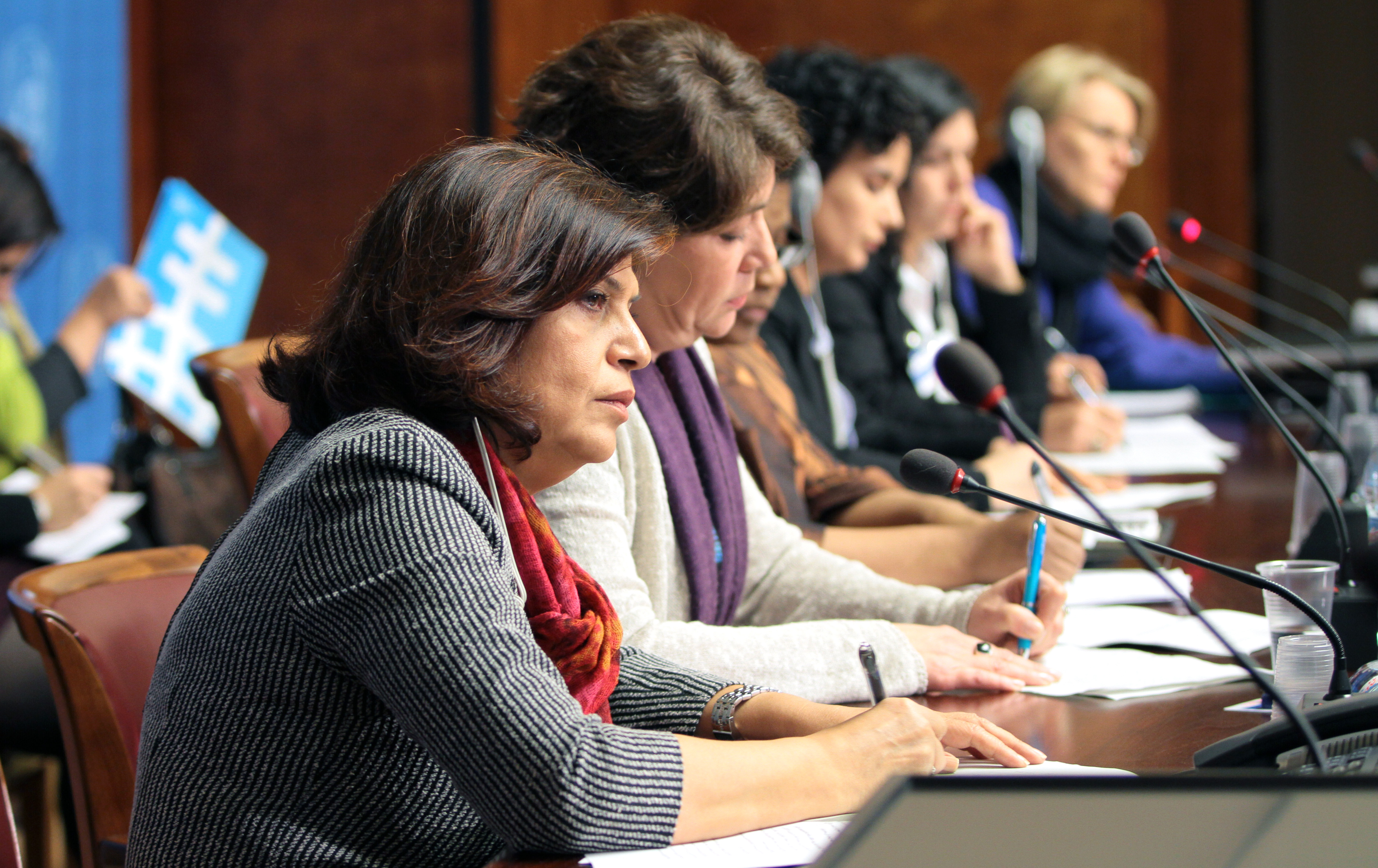
The Issue | Our Solutions | Partners | News & Stories | Publications & Guiding Documents
The Issue
Since the beginning of the conflict in Syria, Syrian women have been pushing for a Syrian owned and led inclusive political solution to a protracted conflict that has entered its 11th year. In the face of continued crisis, Syrian women continue to exercise leadership roles across the country and in the UN-led political process. They have made vital contributions in humanitarian assistance and peacemaking efforts, healthcare and education — serving as breadwinners of their families, as humanitarian first responders, leaders in displacement camps, and as peacebuilders.
To date, the Syrian crisis has left nearly 12 million people in the country requiring urgent humanitarian assistance, 4 million dependent on cross-border aid, 5.7 million forced to flee and reside as refugees far from home, along with an additional 6.6 million people displaced inside the country. The conflict has disproportionately impacted Syrian women and girls. Of those who need humanitarian aid, half are women and girls. Syrian women have higher rates of poverty than men; they face increased risk of gender-based violence; and they shoulder the responsibility of caring for their children and other family members.
Current context
DID YOU KNOW? The Syrian women’s movement has successfully influenced and contributed to securing several gender equality gains in the UN-led political process including:
- Advocating for the formation of the Women’s Advisory Board (WAB) in 2016
- Calling for minimum quotas for women in institutions and decision-making bodies, successfully resulting in 30% women’s participation in the Constitutional Committee established under Security Council resolution 2254
- Advocating for the inclusion of gendered language in various key documents related to the political process
- Since 2019, 9 Syrian women have given high-level briefings to the Security Council, demonstrating the increased attention on the role of women in the Syrian context. Before 2019, no Syrian women representing civil society had ever briefed the Security Council.
Globally, the COVID-19 pandemic has resulted in a spike in violence against women in the midst of lockdowns and quarantine measures, while women and girls, particularly refugee women, have found their livelihoods threatened. Women are taking on extra burdens of unpaid care work, while 70% of healthcare workers are women, adding to the immense pressure women are facing in the current context. In Syria, the COVID-19 pandemic has further compounded the risks and hardships for millions of people inside the country and for refugees around the region. In response, Syrian women have swiftly engaged in humanitarian and awareness-raising activities, with some joining the UN Special Envoy for Syria and others to urge a nationwide ceasefire.
Despite their leadership across the country, Syrian women continue to face challenges in political life. Although there have been positive gains in recent past—including the inclusion of nearly 30% women in the Constitutional Committee, amendments to the Personal Status Law, increased participation in training and skills development activities, and a rise in female entrepreneurship in the country since the beginning of the conflict—women’s direct participation in the high-level political efforts and the percentage of women in parliament continue to remain disappointingly low and discriminatory legislations still exist.
Our Solutions
Building and leveraging the influence of women as peace actors and decision-makers is critical in working for a just future for Syria. Women leaders and women’s civil society, including those supported by UN Women, have continuously advocated for the meaningful participation of women and inclusion of gender perspectives in the political process since the early days of the crisis.
IMPACT OF COVID-19
Although lockdowns due to the COVID-19 pandemic and restrictions on travel have posed significant challenges to the participation of the WAB in the ongoing political process, continued to meet in over 30 virtual sessions, engaging with high-level UN officials, the EU, Member States, and other stakeholders in 2020
The WAB has also continued to provide advice to the Special Envoy, through a mixture of virtual and in-person meetings, and their inputs have often been acknowledged in his briefings to the Security Council and others.
In support of Syria’s political process under Security Council resolution 2254 (2015), and in line with the UN Security Council's landmark resolution 1325 (2000), which enshrines the essential role of women in securing and maintaining peace, UN Women has been bolstering Syrian women’s leadership in peace-making since 2013. This has included support to the Office of the Special Envoy (OSE) for Syria, strategic engagement and logistical, technical, translation and interpretation support to the work of the Women’s Advisory Board (WAB) in close collaboration with the OSE, as well as support to Syrian civil society. UN Women further engages in international coordination and research on gender equality and women’s rights in the context of Syria’s political process.
Partners
These efforts are implemented in close collaboration with the Office of the Special Envoy for Syria, the broader Department of Political and Peacekeeping Affairs (DPPA), with the generous support of the European Union (EU) and the Governments of Finland, Norway, and the Netherlands.
News and Stories
Learn more:
- From where I stand: Monira Hwaijeh
- Video: Meet members of the Women’s Advisory Board: Asma Kaftaro | Noubhar Moustafa | Munira Hawyjeh
- Syrian women’s peace efforts: Crucial yet unrecognized
- Video: Women on the Frontlines of Conflict Resolution: Syria
- Crisis update: Women of Syria, eight years into the crisis
- The second UN-EU conference on Supporting the future of Syria and the region starts in Brussels
- “It Takes a Woman” to build peace in Syria
- Women of Syria, a strong constituency for peace
- Press Release: Syrian Women's Advisory Board shares experience in exploring solutions for peace
- A snapshot of UN Women’s work in response to the crisis in Syria
- Syrian women rise above differences and forge a statement of unity
- Statement by UN Women Executive Director Phumzile Mlambo-Ngcuka on the establishment of the Syrian Women’s Advisory Board to contribute to peace talks
- Conference of Syrian women, convened by UN Women and the Netherlands, ends with strong recommendations for upcoming peace talks
- Video: Women of Syria: An appeal for peace
- Promoting Syrian Women’s Engagement in the Syrian Political Process
- Statement: “The inclusion of women and gender equality must be an integral part of any political solution and transitional arrangements for Syria” – Executive Director
Publications & Guiding Documents
- Eighteen Years on: Assessing the Implementation of the UNSCR 1325 Women, Peace and Security Agenda in the Arab States Region
- Women on the Frontlines of Conflict Resolution: Community Voices from Syria, Iraq and Yemen
Documents guiding the inclusion of women in the UN-led political process:
- UN Security Council resolution 2254 (2015)
- Final Communiqué of the Action Group for Syria (Geneva Communiqué) (2012)
- 12 Living Intra-Syrian Essential Principles (2017)
- Terms of Reference and Core Rules of Procedure for a Syrian-led, Syrian-owned, credible, balanced and inclusive Constitutional Committee facilitated by the United Nations in Geneva (2019)
- Code of Conduct for Members of the Constitutional Committee and Initial Procedural Practices of the Co-Chairs of the Constitutional Committee (2019)
